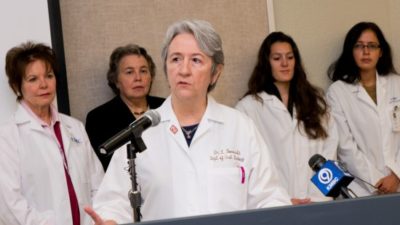UMKC medical research reaches deep into the community
University of Missouri-Kansas City researchers are pioneering prevention, treatments and cures for medical conditions that especially affect Jackson County residents.
Their discoveries, outlined at a forum at the UMKC School of Dentistry, would lead to better health, easing financial and quality-of-life burdens —and would be accelerated by the proposed Institute for Translational Medicine of Jackson County, on the ballot Nov. 5.
“The institute does not represent a new effort starting from scratch,” said UMKC Chancellor Leo E. Morton. “Rather, it represents an opportunity to advance great work at UMKC — to take it to the next level in ways that will both improve health care and stimulate our local economy.”
UMKC researchers provided an overview of their specific activities to help:
The Aging: 13 percent of Jackson County is 65 or older.
Lynda Bonewald, UMKC Vice Chancellor for Translational and Clinical Research and Director of the UMKC Center of Excellence in the Study of Dental and Musculoskeletal Tissues, is a world leader in bone and mineralized tissue research. The loss of bone (osteoporosis) and muscle (sarcopenia) are tremendous, growing public health problems — especially as baby boomers age.
Bonewald led event attendees including media on a tour of her department’s labs at the School of Dentistry. Bonewald detailed a better bone cement she and collaborators have developed that would help millions of Americans who undergo joint replacement surgeries such as hip and knee replacements. As the baby boom generation ages, that figure will increase substantially. The surgeries require the use of bone cement to attach the artificial joint replacement to the surrounding bone. But the current cement commonly used for those procedures damages the surrounding bone, causing pain and requiring additional procedures.
“With our knowledge of bone structure and function, we are developing a new bone cement without these damaging side effects,” Bonewald said. “That translates into less pain and fewer procedures for the patient, lower costs for our health system, and a potential billion dollar market for a medical advance developed here in Jackson County.”
Bonewald said the institute would pave the way for clinical trials, which would start helping people in three to five years vs. a decade.
African Americans: 1 in 4 Jackson County residents is African American.
Jannette Berkley-Patton, director of the UMKC Community Health Research Group and an assistant psychology professor, is a nationally known researcher addressing African American health disparities.
Currently, African Americans have higher than average rates of many diseases and health risk factors. The UMKC Community Health Research Group’s model to address HIV through dozens of African American churches in the Kansas City area has been adopted in Montgomery, Alabama.
The latest research mission led by Berkley-Patton is tackling diabetes and heart disease/stroke in African Americans. Focusing on health through faith communities makes sense, says Berkley-Patton, since most African Americans attend worship services.
“Ultimately, over the next few years, we have a vision of wanting to have worked with hundreds of churches and to reach many more thousands of people through our research right here in our urban area,” Berkley-Patton said. “And have a significant impact on health disparities in Jackson County.”
The Visually Impaired: 1 in 5 Jackson County residents report vision problems.
Jackson County also has a high-risk population for developing glaucoma, a major cause of blindness.
David Westbrook, a senior vice president at Children’s Mercy, who is blind from glaucoma, talked about how far research has come and how it is improving by sharing the story of 17-year-old Emily Mallette of Lee’s Summit. Mallette’s physician is from the Vision Research Center at UMKC, which has developed treatments for glaucoma and other major vision conditions.
“Emily and I both had juvenile glaucoma,” Westbrook said. “She can still see. I can’t. The difference is research.”

